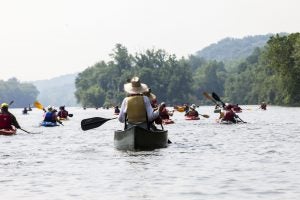What should your city do with its waterfront?

Men run along the banks of the Schuylkill River in Philadelphia. (AP Photo/Matt Rourke)
Tell us your hopes and dreams for your city’s rivers.
You might be seeing a lot of ice these days, but we want you to think about water. Particularly, the waterfronts in your town or city.
So many Pennsylvania cities are located next to a river. There’s the Delaware River in Philadelphia and Chester, the Allegheny, Monongahela and Ohio rivers in Pittsburgh, the Susquehanna River in Harrisburg, and the Lehigh River in Allentown.
Officials from many of these cities say they want to make better use of their waterfronts, and some have made strides in that direction. In 2014, for instance, Philadelphia experimented with a pop-up urban beach called Spruce Street Harbor Park. The park was open from July until the end of September, and it was a hit.
In Fall 2014, the city also opened the Schuylkill Banks Boardwalk, an extension of the Schuylkill River Trail, a series of greenways, parks, and docks alongside the river.
Philadelphia is also getting some international help in addressing some of the former industrial land on the Delaware River. This weekend, Drexel University is hosting a two-day workshop that will bring its own urban design students together with students from Germany’s TU Dortmund University, which “teaches the global intersection between man, nature and technology.” Together, the students will come up with a specific plan to revitalize the waterfront and release the plan publicly.
Allentown is about to undergo its own riverfront revitalization as part of the Neighborhood Improvement Zone, an area of the city where developers can use tax dollars they would have paid to the state to fund construction.
Waterfront Partners, a partnership of real estate firm Jaindl Properties and Dunn Twiggar Co., is investing $325 million to create one million square feet of mixed-use space on the Lehigh River, including a new main street, apartments, offices, two parking decks, and floating docks. Principal Mark Jaindl told us his firm is hoping to create a 24/7 “live, work, play” neighborhood.
Pittsburgh is building Three Rivers Park, a 13-mile park system connecting the Allegheny, Monongahela and Ohio rivers. It’s more than 80 percent finished, and includes a former steel mill site that developers are planning to turn into open space.
At the same time, some cities that have attempted to revitalize their waterfronts are in jeopardy. In Chester, Caesar’s Entertainment took advantage of Keystone Opportunity Zone tax benefits to build Harrah’s Philadelphia casino (previously known as “Harrah’s Chester”) on the banks of the Delaware River. There was little to no economic development spinoff in the streets of the city itself, but the casino did attract other development to the waterfront, including soccer stadium PPL Park.
The city of Chester now relies on gaming proceeds from Harrah’s for about 30 percent of its annual operating revenue. But Harrah’s general manager Ron Baumann fears that Harrah’s won’t be able to withstand casino gambling competition from a new casino that will be built in South Philadelphia. If Harrah’s shuts down, Chester will face a gaping hole, not only in its operating budget, but on its waterfront.
All this is to say that Pennsylvania cities are abuzz about waterfront revitalization. The many projects raise questions, like who should benefit from riverfront development? And what’s the best way for a city to use vacant or former industrial land?
We know it’s currently a frozen hellscape outside, so waterfront activities — whether that’s kayaking or tubing, summertime festivals, sailing, or even commerce — may not be the first thing on your mind.
But it’s almost March. It’s time to start thinking about those waterfronts.
Tell us your likes, dislikes, hopes, dreams, and fears about your city’s waterfront on Twitter @pacrossroads, on Facebook at Keystone Crossroads, or via email at msegarra@whyy.org.
WHYY is your source for fact-based, in-depth journalism and information. As a nonprofit organization, we rely on financial support from readers like you. Please give today.



